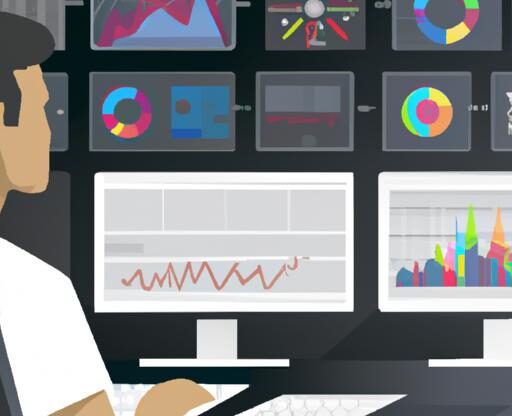How to Become a Data Scientist with No Experience
Introduction
In today’s digital age, the demand for data scientists is skyrocketing as businesses strive to make sense of the vast amounts of data at their disposal. Data scientists play a crucial role in extracting valuable insights from data, driving decision-making processes, and shaping the future of industries ranging from healthcare to finance.
The field of data science is not only in high demand but also critical for businesses to stay competitive in a data-driven world. As companies collect massive amounts of data, the need for skilled professionals who can analyze, interpret, and derive actionable insights from this data has never been more vital. Data science is not just a buzzword; it is the backbone of innovation and success in today’s fast-paced business landscape. So, how can you embark on a journey to become a data scientist even if you have no prior experience in the field? Let’s explore the steps you can take to kickstart your career in data science.
What is a Data Scientist?
Definition of a Data Scientist
A data scientist is a professional who specializes in analyzing and interpreting complex data to extract valuable insights that can inform strategic decision-making. They possess a unique blend of skills in statistics, programming, and data visualization, allowing them to uncover patterns, trends, and correlations within datasets.
Skills and Qualifications Required
To become a successful data scientist, one must have a strong foundation in mathematics, statistics, and computer science. Proficiency in programming languages such as Python, R, and SQL is essential for data manipulation and analysis. Additionally, data scientists should be adept at data visualization tools like Tableau or Power BI to communicate findings effectively. A curious mindset, problem-solving skills, and the ability to work with large datasets are also crucial for excelling in this field. Continuous learning and staying updated on industry trends are key to thriving as a data scientist in today’s dynamic environment.
Steps to Become a Data Scientist with No Experience
Research the Field of Data Science and Understand Its Importance
Before diving into the world of data science, it’s essential to conduct thorough research to understand the fundamentals of the field and its significance across various industries. Familiarize yourself with the key concepts, trends, and real-world applications of data science to grasp its potential impact on businesses and society.
Learn the Basics of Statistics, Programming Languages, and Data Analysis Tools
To excel in data science, you must acquire a strong foundation in statistics, programming languages such as Python or R, and data analysis tools like SQL and Tableau. These skills are essential for data manipulation, visualization, and interpretation, enabling you to extract valuable insights from complex datasets effectively.
Enroll in Online Courses or Bootcamps to Gain Practical Skills
One of the best ways to kickstart your journey into data science is by enrolling in online courses or bootcamps that offer structured learning programs tailored for beginners. These resources provide hands-on experience, practical exercises, and expert guidance to help you develop the necessary skills and knowledge required to succeed in the field.
Build a Portfolio of Projects to Showcase Your Abilities
Creating a portfolio of data science projects is crucial for demonstrating your expertise and problem-solving abilities to potential employers. Work on diverse projects that showcase your analytical skills, creativity, and ability to derive meaningful insights from data, highlighting your proficiency in handling real-world data science challenges.
Network with Professionals in the Data Science Industry
Networking plays a vital role in the data science community, allowing you to connect with industry professionals, mentors, and like-minded individuals who can offer valuable insights, guidance, and career opportunities. Attend data science events, join online forums, and engage with experts to expand your network and stay updated on the latest trends and developments in the field.
Apply for Entry-Level Positions or Internships to Gain Hands-On Experience
To gain practical experience and further enhance your skills, consider applying for entry-level data science positions or internships. These opportunities provide valuable hands-on experience, exposure to real-world projects, and the chance to work alongside experienced professionals, accelerating your learning curve and preparing you for a successful career in data science.
Resources for Learning Data Science
List of Online Courses and Tutorials
Embarking on a journey to become a data scientist with no prior experience can be daunting, but with the plethora of online courses and tutorials available, you can kickstart your learning journey. Platforms like Coursera, Udemy, and DataCamp offer comprehensive courses on data science fundamentals, machine learning, and data analysis. These courses provide a structured learning path, hands-on projects, and the opportunity to interact with instructors and peers in the field.
Recommendations for Programming Languages and Tools
To excel in data science, it is essential to master programming languages and tools commonly used in the industry. Python and R are popular programming languages for data analysis and machine learning, while tools like Jupyter Notebook, SQL, and Tableau are indispensable for data visualization and analysis. By honing your skills in these languages and tools, you can enhance your data science capabilities and stand out as a competitive candidate in the job market.
Tips for Staying Updated on the Latest Trends
The field of data science is constantly evolving, with new techniques, algorithms, and tools emerging regularly. To stay ahead of the curve, it is crucial to stay updated on the latest trends and advancements in data science. Engage with online communities, attend webinars and conferences, and follow industry experts on social media to stay informed about the latest developments in the field. By continuously learning and adapting to new trends, you can position yourself as a knowledgeable and skilled data scientist ready to tackle complex data challenges.
Common Challenges and How to Overcome Them
Lack of formal education or experience in data science
One of the most common challenges aspiring data scientists face is the lack of formal education or experience in the field. While a background in mathematics, statistics, or computer science can be beneficial, it is not always a prerequisite for entering the world of data science. With the abundance of online resources and self-study materials available, you can bridge the gap and acquire the necessary skills to succeed in data science.
Imposter syndrome and self-doubt
Imposter syndrome, characterized by feelings of inadequacy and self-doubt, can plague even the most talented individuals entering a new field like data science. It is essential to recognize that learning and growth come with challenges and setbacks. Embrace the learning process, seek support from peers and mentors, and remember that everyone starts somewhere. Overcoming imposter syndrome requires building confidence in your abilities and focusing on continual improvement.
Finding opportunities for hands-on experience
Gaining hands-on experience is crucial in transitioning into a data science role. While formal education can provide a strong foundation, practical experience through internships, projects, and real-world applications is invaluable. Seek out opportunities to work on data science projects, collaborate with industry professionals, and showcase your skills through a diverse portfolio. Hands-on experience not only enhances your technical abilities but also demonstrates your passion and commitment to a career in data science.
Dealing with rejection and setbacks
Rejection and setbacks are inevitable in any career journey, including data science. Whether facing rejection from job applications or encountering challenges in your projects, it is essential to approach setbacks as learning opportunities. Stay resilient, adapt to feedback, and continue honing your skills. Remember that success in data science is not defined by avoiding failure but by how you overcome obstacles and grow from them. Embrace setbacks as stepping stones to your success in the dynamic field of data science.
Conclusion
In conclusion, embarking on a career as a data scientist with no prior experience may seem daunting, but it is definitely achievable with dedication, perseverance, and the right resources. By following the steps outlined in this article, you can set yourself on the path to becoming a successful data scientist, even if you are starting from scratch.
Remember, the field of data science is constantly evolving, and there is always something new to learn. Stay curious, keep honing your skills, and don’t be discouraged by setbacks along the way. With determination and a passion for data, you can overcome any challenges and carve out a fulfilling career in this exciting and in-demand field.
So, are you ready to take the leap and become a data scientist with no experience? The journey may be challenging, but the rewards are boundless. Start your data science adventure today and unlock a world of possibilities in this dynamic and rewarding career path.





